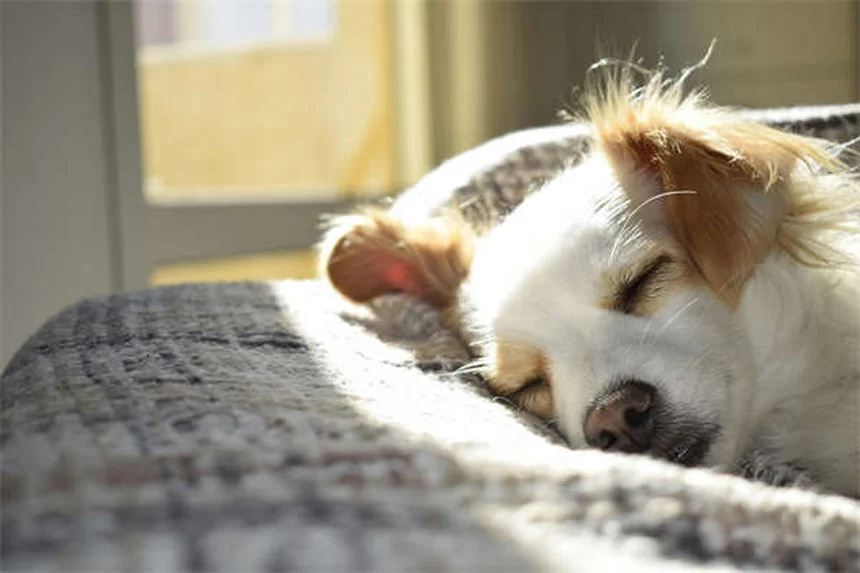Advertisement
Wondering what natural calming herbs work best for anxious cats? The answer is: several herbal remedies can safely help relax your stressed feline! After a decade of researching pet wellness trends, I've found that herbs like chamomile, valerian root, and ashwagandha show real promise for calming kitty nerves without harsh medications. Here's the deal - your cat's stress might stem from things you wouldn't even notice, like that new air freshener or your neighbor's barking dog. That's where these gentle herbal solutions come in. They work with your cat's natural biology to promote relaxation, whether you're dealing with vet visit anxiety or chronic stress from multi-cat household tension. In this guide, we'll break down exactly which herbs work, how to use them safely, and when you might need to consider prescription options instead. Let's help your feline friend find their chill!
E.g. :5 Warning Signs Your Cat Has Hot Spots (And How to Fix Them Fast)
- 1、Why Your Cat Needs Natural Calming Solutions
- 2、Top Herbal Heroes for Anxious Felines
- 3、Supplement Solutions for Stressed Cats
- 4、Aromatherapy for Anxious Kitties
- 5、Natural vs. Prescription: Finding the Right Balance
- 6、Putting It All Together
- 7、The Science Behind Feline Anxiety
- 8、Environmental Enrichment Strategies
- 9、Dietary Approaches to Calming
- 10、Behavioral Modification Techniques
- 11、Tech Solutions for Anxious Cats
- 12、When to Seek Professional Help
- 13、FAQs
Why Your Cat Needs Natural Calming Solutions
Picture this: your cat's lounging on the windowsill when suddenly - BAM! - your hyperactive golden retriever comes charging in. This is why we need calming solutions. Unlike wild cats who can escape stressful situations, our house cats often feel trapped in their own homes.
The Modern Cat's Stressful Reality
You'd think being pampered with automatic feeders and heated beds would make cats the most relaxed creatures on earth, right? Wrong. The truth is, domestic cats face unique stressors that their wild cousins never experience.
Between territorial disputes with other pets, loud household noises, and the sheer boredom of indoor life, many cats live in a constant state of low-grade stress. This chronic stress can lead to:
- Excessive grooming
- Aggressive behavior
- Litter box avoidance
- Decreased appetite
Top Herbal Heroes for Anxious Felines
Ancient Remedies for Modern Cats
Let's explore some time-tested herbal solutions that might help your stressed-out kitty. While research on cats specifically is limited, these herbs have shown promise in other species and centuries of traditional use.
| Herb | Potential Benefits | Fun Fact |
|---|---|---|
| Ashwagandha | Reduces cortisol levels | Called "Indian ginseng" in Ayurveda |
| Chamomile | Calms nervous system | Same herb in your bedtime tea |
| Valerian Root | Promotes relaxation | Smells like dirty socks to humans! |
 Photos provided by pixabay
Photos provided by pixabay
Herbal Combinations That Work
Many commercial products combine several herbs for enhanced effects. For example, Pet Wellbeing Stress Gold blends chamomile, passionflower, and skullcap into a bacon-flavored liquid that even picky cats will lap up.
Here's a pro tip: when introducing new herbs, always start with small doses and monitor your cat closely. Some kitties might react differently than others - just like how some humans can drink coffee before bed while others can't!
Supplement Solutions for Stressed Cats
Nutritional Support for Nervous Systems
Did you know your cat's gut health directly affects their mood? It's true! Supplements like L-Tryptophan (found in turkey) and B vitamins can help balance your cat's stress response.
Here's a quick comparison of popular calming supplements:
- L-Theanine: Increases "feel-good" brain chemicals
- Melatonin: Regulates sleep and anxiety cycles
- Milk Proteins: Mimics anti-anxiety medications naturally
When to Consider Supplements
Ever noticed your cat hiding during thunderstorms or vet visits? That's when these supplements can really shine. They're perfect for temporary stressful situations rather than chronic anxiety issues.
Remember: always consult your vet before starting any new supplement regimen. What works for one cat might not work for another, and some supplements can interact with medications.
Aromatherapy for Anxious Kitties
 Photos provided by pixabay
Photos provided by pixabay
Herbal Combinations That Work
Here's something fascinating - cats have a second nose called the vomeronasal organ that detects pheromones! This is why certain scents can have such powerful calming effects.
But beware: essential oils can be dangerous for cats if used improperly. Always dilute heavily and never apply directly to your cat's fur or skin.
Pheromone Power
Have you tried Feliway diffusers? These synthetic pheromone products mimic the "happy messages" cats leave when rubbing their faces on furniture. Many cat parents swear by them for multi-cat households.
Other scent-based options include:
- Lavender sachets placed away from cat areas
- Catnip sprays for stressful situations
- Flower essence blends like Rescue Remedy
Natural vs. Prescription: Finding the Right Balance
When Nature Isn't Enough
While natural remedies work wonders for mild anxiety, sometimes prescription medications are necessary. If your cat shows severe symptoms like self-mutilation or complete withdrawal, it's time to consult your vet about stronger options.
Think of it this way: you wouldn't treat a broken arm with just herbal tea, right? The same logic applies to serious feline anxiety cases.
 Photos provided by pixabay
Photos provided by pixabay
Herbal Combinations That Work
The most effective approach combines multiple strategies. For example:
- Use pheromone diffusers throughout your home
- Add calming supplements during high-stress periods
- Provide plenty of vertical spaces and hiding spots
- Consider prescription meds if needed
Remember, every cat is unique. What calms one might excite another (looking at you, catnip!). Be patient as you discover what works best for your feline friend.
Putting It All Together
Helping your anxious cat doesn't have to be complicated. Start with one approach - maybe a pheromone diffuser or some chamomile treats - and observe how your cat responds. Small changes can make a big difference in your cat's quality of life.
And here's the best part: when your cat is relaxed and happy, your home becomes more peaceful too. That's what I call a win-win!
The Science Behind Feline Anxiety
Understanding Your Cat's Brain Chemistry
You know that feeling when you're stuck in traffic and your stress levels skyrocket? Your cat experiences similar chemical reactions when stressed. The amygdala (their fear center) goes into overdrive, flooding their system with cortisol.
Here's something fascinating - cats produce only 10% of the serotonin that humans do. This "happy chemical" deficit makes them particularly vulnerable to anxiety. That's why natural solutions that boost serotonin precursors (like L-Tryptophan) can be so effective.
Evolutionary Roots of Feline Stress
Ever wonder why your cat freaks out at plastic bags? Their ancestors needed hyper-vigilance to survive. Modern house cats retain these instincts even though the threats are gone.
We've essentially taken jungle predators and turned them into couch potatoes. No wonder they get stressed! Their bodies are wired for hunting and territorial patrols, not binge-watching Netflix with you (though some certainly try).
Environmental Enrichment Strategies
Creating a Cat-Friendly Home
Think like an interior designer - for cats! Vertical spaces are crucial. Wall shelves, cat trees, and window perches give them safe observation points.
Did you know the ideal cat home has at least one elevated spot per room? It's true! This simple adjustment can reduce territorial stress by up to 40% in multi-cat households.
The Power of Play Therapy
Here's a fun fact: 15 minutes of interactive play reduces feline stress hormones more effectively than most calming treats. Wand toys that mimic prey movements are particularly effective.
Try this schedule:
- Morning: 5-minute feather chase session
- Afternoon: Food puzzle challenge
- Evening: 10-minute laser pointer marathon
Dietary Approaches to Calming
Gut-Brain Connection in Cats
Your cat's digestive system contains millions of neurons that communicate directly with their brain. That's why probiotic-rich foods can have calming effects.
Consider adding these gut-friendly foods:
| Food | Benefit | Serving Suggestion |
|---|---|---|
| Fermented goat milk | Natural probiotics | 1 tsp mixed with meals |
| Bone broth | Gut-healing collagen | 2 tbsp as a snack |
| Pumpkin puree | Prebiotic fiber | 1/2 tsp daily |
Hydration and Anxiety
Dehydration amplifies stress responses. Yet most cats drink 20% less water than they need. Try these tricks:
- Place water bowls away from food (cats prefer this)
- Use ceramic or glass bowls (plastic can taint taste)
- Add a pet water fountain (running water attracts cats)
Behavioral Modification Techniques
Positive Reinforcement Training
Wait - you can train cats? Absolutely! Clicker training builds confidence and reduces anxiety. Start with simple commands like "sit" using high-value treats.
Here's the secret: training sessions should be kept under 3 minutes. Cats have shorter attention spans than dogs. Multiple mini-sessions throughout the day work best.
Desensitization Methods
Is your cat terrified of the vacuum? Try this gradual approach:
- Place turned-off vacuum in room
- Reward cat for investigating it
- Turn on vacuum in another room
- Gradually decrease distance over weeks
This technique works for any fear trigger - from strangers to car rides. The key is going at your cat's pace.
Tech Solutions for Anxious Cats
Innovative Calming Devices
The pet tech market has exploded with anxiety solutions. My favorite? The calming pet camera that dispenses treats and plays soothing music when it detects stressed behaviors.
Other cool gadgets:
- Pressure wrap shirts (like ThunderShirt for cats)
- Heated cat beds with heartbeat simulation
- Interactive puzzle feeders that reward calm behavior
Music Therapy for Felines
Did you know cats prefer music composed specifically for their hearing range? Researchers created "cat music" using frequencies similar to purring and bird chirps.
Studies show this specialized music:
- Reduces vet clinic stress by 38%
- Decreases boarding anxiety symptoms
- Helps shy cats come out of hiding
When to Seek Professional Help
Recognizing Severe Anxiety
How can you tell when it's more than just typical feline fussiness? Watch for these red flags:
- Excessive self-grooming to the point of bald spots
- Complete withdrawal for more than 48 hours
- Aggression that causes injury
If you notice these signs, don't wait - schedule a vet visit immediately. Severe anxiety can lead to serious health complications.
Working With Cat Behaviorists
Certified feline behavior consultants can work wonders. They'll analyze your home setup, cat interactions, and routines to create a customized stress-reduction plan.
A good behaviorist will:
- Observe your cat in their home environment
- Identify specific stress triggers
- Provide hands-on training demonstrations
- Follow up with progress checks
E.g. :Natural Calming Herbs and Supplements for Cats | PetMD
FAQs
Q: Are calming herbs safe for all cats?
A: Most calming herbs are generally safe for healthy adult cats when used properly, but there are important exceptions. We always recommend consulting your vet first, especially if your cat has existing health conditions or takes medications. Start with small doses and watch for any unusual reactions - some cats might get more excited rather than calmer with certain herbs like valerian root. Pregnant cats and kittens typically shouldn't use herbal remedies unless specifically approved by your veterinarian. Remember, "natural" doesn't automatically mean "safe" for every situation!
Q: How quickly do calming herbs work for cats?
A: The effects can vary dramatically depending on the herb and your cat's individual response. Fast-acting options like chamomile might show effects within 30-60 minutes, while adaptogenic herbs like ashwagandha may take several days of consistent use to build up in your cat's system. For immediate stressful situations (like thunderstorms or car rides), liquid extracts or sprays tend to work fastest. For chronic anxiety, we suggest giving any herbal remedy at least 2-3 weeks before evaluating its effectiveness. Keep a little journal to track your cat's responses - this helps identify what works best for your particular feline!
Q: Can I give my cat human herbal supplements?
A: This is where we need to be extra careful. Many human herbal supplements contain additional ingredients (like alcohol preservatives or xylitol) that can be toxic to cats. The dosage is also completely different - a human-sized dose could overwhelm your cat's small system. Always choose products specifically formulated for felines, and check that they don't contain any artificial sweeteners or additives. When in doubt, consult with a holistic veterinarian who understands both herbal medicine and feline physiology. Better safe than sorry when it comes to our furry friends!
Q: What's the best way to administer calming herbs to cats?
A: Getting finicky felines to take their herbs can be tricky! Here are our top delivery methods: 1) Mix powdered herbs into strong-smelling wet food (try fish flavors), 2) Use alcohol-free liquid extracts dropped onto treats or paws (they'll lick it off), 3) Try commercial herbal treats with appealing flavors, or 4) Use herbal sprays on bedding (great for cats who refuse anything oral). Start with tiny amounts and gradually increase - cats are more likely to accept new things when introduced slowly. And never force it - stress from forced administration can cancel out the herbs' benefits!
Q: How do calming herbs compare to prescription anxiety meds for cats?
A: Herbs and medications each have their place in feline anxiety management. Herbs work best for mild to moderate stress and are generally gentler with fewer side effects. Prescription meds (like fluoxetine) are typically needed for severe anxiety cases involving self-harm or aggression. Many cat parents find success using herbs for daily maintenance while keeping prescription options for extreme situations (like fireworks night). The key difference? Herbs support the body's natural calming mechanisms, while medications directly alter brain chemistry. Your vet can help determine the right balance for your cat's specific needs.







